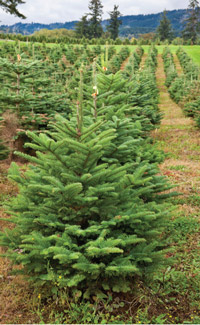Soil & sea: reports from our producers
This article was originally published in December 2013

This year, the Christmas tree at the U.S. Capitol building in Washington, D.C., is an 88-foot Engelmann Spruce cut in Washington state. The “Peoples Tree” is decorated with lights and thousands of handcrafted ornaments made by Washingtonians. The tree-lighting ceremony showcased Washington state’s historical, cultural and natural beauty.
Washington apple production climbed 16 percent to $2.25 billion in 2012. It’s the first commodity in the state to pass the $2 billion mark. Apples are the top commodity in the state, representing 23 percent of the total agriculture value.
U.S. farmer, rancher and fishery cooperatives set records for sales, income and assets in 2012, buoyed by strong prices for grain, farm supplies and many other agricultural commodities. Sales by agricultural and fishery co-ops of nearly $235 billion surpassed the 2011 record by $18 billion, an 8.3 percent gain.
Washington farmers and ranchers set a production record last year, reportedly growing crops and raising livestock worth $9.89 billion — a 6 percent increase from 2011.
The U.S. Department of Agriculture (USDA) has released the first report of its kind about grass-fed beef. In addition to market commentary and price info, the monthly report is meant to help the grass-fed industry market its products.
The Seafood Watch program has asked the Obama administration to stop undoing efforts to ban the trade in shark fins in states across the country. The federal government recently issued a proposal to reverse state laws prohibiting the sale, trade and possession of shark fins.
Greenpeace is leading a campaign to protect the Bering Sea Canyons, which are home to squid, salmon and a countless variety of marine life. The canyons, situated between Alaska and Russia, are where more than half of wild seafood in the U.S. is caught.
